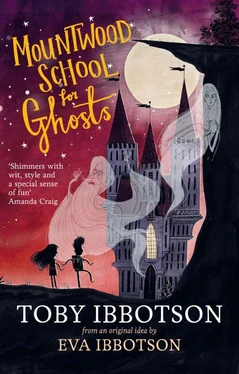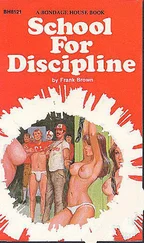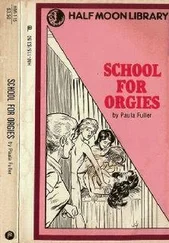At that moment Jack Bluffit was imagining Lord Ridget swimming in sewage, but he gritted his teeth and said, ‘Right then, if you are going to stop the Markham Park development, I’ll just give the contractor a ring. He’s waiting for the go-ahead from me to move in and start making a right old mess of your precious riverbank.’ He reached out to the telephone and picked up the receiver.
‘No, stop, hang on! Wait!’ yelped Lord Ridget.
Bluffit put the receiver down again. ‘Well?’
Lord Ridget collapsed into a chair like a puppet whose strings had been cut. His face was a picture of melancholy and despair. He put his head in his hands and groaned. In a few months he would look out of his bedroom window and see, not the ancient willows lining his peaceful river, but houses and motorbikes and people. In his mind’s eye he saw them throwing plastic bottles and cigarette ends into the river, dumping rusty bicycles. There might even be children who paddled. It was no good; he simply could not bear it.
He sighed deeply, took a gold fountain pen from his inside pocket and signed the document that Jack Bluffit thrust under his well-bred nose.
When he had gone, shaking his head and mumbling to himself, Jack sat down at his desk. Things were working out. They always did.
He started happily looking over the plans for the new development. He would have to make sure that no buildings or traffic signs spoilt the view of the statue from the main road. A few years ago some idiots on a council had spent a huge amount of money on a great big sculpture and plonked it down on a hill a mile or two outside their city. It was supposed to be some kind of angel; it looked more like a rusty aeroplane to him. But it had to be admitted, after a year or two it had become a landmark for the whole area. Everybody knew about it; every tired motorist coming back from the south saw it and thought, There it is, I’m home. The trick was visibility. Lines of sight.
Jack was making a few notes in pencil on the blueprints when Snyder appeared in the room carrying a tray.
‘What are you doing here? You’re supposed to knock.’
‘I did, Mr Bluffit.’
‘Are you calling me a liar?’
‘Absolutely not, Mr Bluffit. You, sir? Such a pillar of honesty, such an ornament to the city, a liar — never.’
Jack looked at him sharply. Was Snyder making fun of him? He’d better not be.
Frederick caught Jack’s look, and his eyes darted about the room. He wondered if he had gone too far this time. His hands trembled, and the coffee cup on the tray jiggled and tinkled in its saucer.
‘It’s eleven o’clock, sir.’
Coffee time. Jack reached out for his cup.
‘Where’s the paper? What’s got into you today?’
‘Ah, the paper. I may have mislaid it, sir.’
‘Mislaid it? You’ve never mislaid anything in your life. What’s going on?’
Snyder didn’t speak.
‘Shove off and get it.’
Snyder left the room and returned quite soon with the morning paper, folded carefully, held out in front of him at arm’s length. He dropped it on the desk, and before a surprised Jack Bluffit could say anything, he turned on his heel and almost ran out of the room.
Jack heard his rapid footsteps pattering away down the corridor. Then he took a sip of his coffee, leaned back in his chair and unfolded the paper. A huge banner headline covered almost the entire front page.
BLUFFIT BLUFFS IT
Underneath, in smaller print, it said ‘Markham Street pensioner gives Bluffit a going-over. See pages 2–4 .’
As he read the article, Jack’s face darkened. His eyes narrowed, and the grinding of his teeth could be heard in the next room, where a secretary thought something had gone wrong with the copying machine and rang down to the service department to get it fixed. Sam Norton, the author of the article, had had great fun. He made a big thing of the frail old woman who had taken the lid off Bluffit’s schemes (he called it ‘opening a can of worms’) and mocked Lord Ridget mercilessly, suggesting that Bluffit had hauled him in to lead the inquiry only because a sack of potatoes couldn’t be dressed in a suit. He had ended the article with a question: ‘How much longer can Jack Bluffit be allowed to treat our city as his personal property?’
With his meaty hands Jack scrunched the newspaper into a ball and hurled it across the room, missing the waste-paper basket by at least a yard. He got up from his desk and paced up and down for a while, imagining all the things he would do to Sam Norton if he ever met him in a dark alley. But after a while he calmed down a bit. Why should he care about being trashed by some little rat of a reporter. Norton was nobody, a cockroach. And nothing could stop him now. Ridget had done his bit. Markham Street was going into the dustbin of history, and that old cow who had tried to nobble him was going the same way.
He returned to his desk and dialled the number of the local television station, to make sure that the result of the Ridget Inquiry made it on to the evening news.
Seventeen
Iffy Breaks the Rules
The Great Hagges had decided to give their students a night off. Drusilla had received a letter in the post from one of her nieces, who wrote that the Grim Ghoul of Grisley Deep was very unwell. He had always had problems with his stomach, which was sensitive, and now he was a mere shadow of his former self. The old mine workings at Grisley were not very far away and the Great Hagges felt it was their duty to help if they could. So Drusilla packed her special bag of tonics and remedies, Fredegonda oiled her thumb and Goneril backed the car out of the old stables and gave it a rub-down. Before they left, Fredegonda gathered the ghosts in the courtyard, and addressed them.
‘We will be away for the night. As responsible phantoms, I am sure you do not need to be told to respect the regulations of this establishment. However, I would like to remind you that if Mountwood is to continue its important work unmolested, we must not create any disturbance in the local community. Vicar Flitch down the road at St Agnes has on several occasions in the past thought about coming here to exorcize Mr Crawe. Imagine how excited he would be if he found out about all of you. So a quiet period mulling over your work and rejuvenating tired ectoplasm is the order of the night.’
With that she climbed into the front seat beside Goneril and the Rolls disappeared up the track to the main road, its headlamps cutting a fine swathe through the shadowy fir trees.
For a while after the Hagges had left the ghosts flitted quietly about, feeling relaxed and sort of holidayish.
The Phantom Welder appeared here and there and said, ‘Boo! How was that for scary?’ until a legless Anglo-Saxon warrior from the Isle of Thanet told him to stop mucking about and leave him alone. Cousin Vera the Banshee drifted into the main hall and sat down on the edge of the well, dangling her spindly legs over the side. She had as usual a touch of the sniffles, and drops formed on the end of her nose and dripped steadily into the dark waters below. They didn’t bother Angus Crawe, nor did her woeful monotonous voice.
Vera liked talking to Angus Crawe, mainly about how she would be bottom of the class at Mountwood, which she had known from the beginning because she had been bottom of the class all her life.
‘I am a failure, you see, a banshee must wail, and I wail not. Or not very well, anyway.’ Angus Crawe did her a lot of good. He never interrupted, he had no opinions, yet she was sure he understood. Sometimes, not very often, she paused to say, ‘You see?’ or ‘Don’t you agree?’ and she always got a reply, if not a very clear one.
‘Divn’na’ or, ‘Why aye, man,’ or, ‘Getaway wi’yus,’ echoed from the depths. But it was enough for her to feel that someone cared.
Читать дальше












